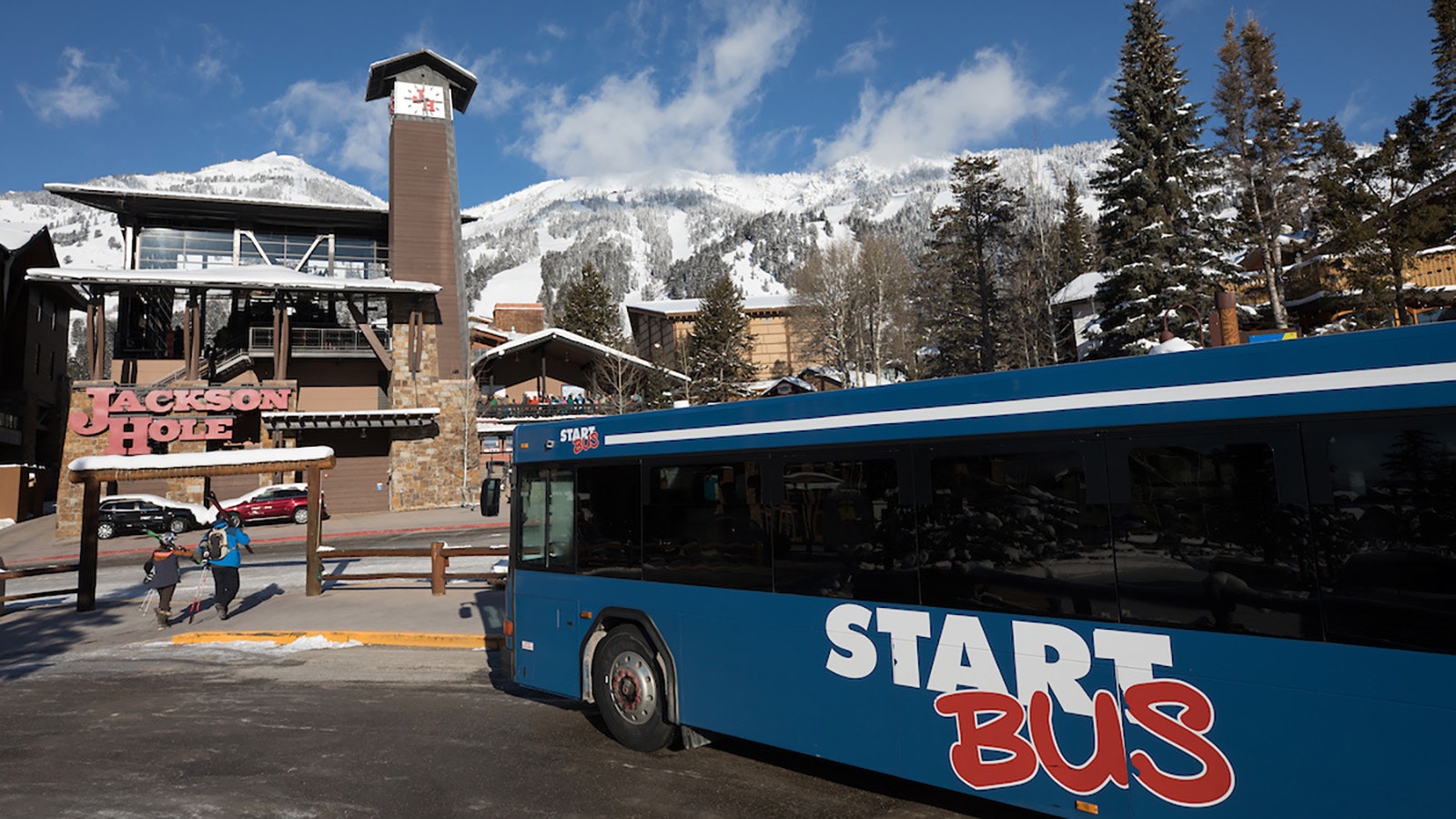Teton Village could use nearly $1 million from a Biden administration program to scrap nearly all its diesel-powered vehicles in exchange for a fleet of four new electric buses to shuttle people to and from Jackson Hole Mountain Resort.
The Teton Village Association has been awarded a $945,178 grant from President Joe Biden’s Federal Transit Administration, which was announced Monday. The money must be used to buy low or no-emission buses and bus facilities. The Village is offering a 20% match, or $166,796.25 contribution, on the project.
The buses, which seat around 35 passengers each, will likely be introduced at some point in 2024 and primed for the 2024/2025 ski season.
“We really want to make sure that we’re maintaining our air quality,” said Melissa Turley, executive director for the Teton Village Association. “We also have so many visitors from around the world. We see it as a great opportunity to be an example for others.”
Teton Village is located directly outside Grand Teton National Park, which receives air quality and visibility protection under the Clean Air Act.
The Teton Village Association will use the money to buy four zero-emission electric buses and charging equipment to replace five diesel vehicles that serve nearly half a million visitors and workers in and around Teton Village and its resorts each year.
A Carrot
State Rep. Landon Brown, R-Cheyenne, co-chair of the Wyoming Legislature’s Joint Transportation committee, told Cowboy State Daily on Wednesday afternoon although he has no problem with Teton Village taking the money, he also finds it an example of short-term decision-making based on the federal government “dangling” money to communities.
Brown worries the purchase is short-sighted and questions how long the buses will last and what their replacement cost will be.
“I think they’re looking at the here and now,” he said of Teton Village’s plans. “There’s almost no information on what it will cost them in the future.”
He also pointed out that when the buses break down, many of their electric parts will likely end up in a local landfill.
Teton Village will still hold onto one smaller diesel bus that is used for summertime shuttles.
Some of the money also will be used to train employees on how to use the new buses and charging equipment.
“As the electric buses are relatively new, there’s an opportunity for some training both on these specific buses and software and all that just to make sure that we have the capacity within our own community to do the repairs and upkeep that’s necessary,” Turley said.
The Program
The grant is part of a $1.7 billion earmark in Biden’s Bipartisan Infrastructure Law for transit projects in 46 states and territories.
Nearly half of the buses will be zero-emission models, bringing the total number of zero-emission transit buses funded by the Bipartisan Infrastructure Law over two years to more than 1,800, which is more than double the number of EV buses on roads now. This still only represents a fraction of the roughly 60,000 buses in operation in the U.S.
"Even if you don't take the bus, these investments will benefit you because your family can breathe cleaner air," Secretary of Transportation Pete Buttigieg said on a call with reporters, according to Fox Business.
But not all of the buses will be zero emission. At least half will be powered by natural gas or “another fuel source that makes our air far less toxic,” Veronica Vanterpool, deputy administrator for the FTA, told The Verge.
The purpose of this program is to incentivize towns and municipalities to implement green-friendly mass transit.
“It seems like they’re cutting off their nose to spite our face at this point because we want to reduce emissions,” Brown said.
Brown also said there are stipulations and commitments often attached to grants like these. To receive the grant money, Teton Village had to submit a Zero-Emission Transition Plan and make a commitment to use some of the money on workforce development.
What About The Winter?
A typical transit diesel bus carries 100 gallons of gas, giving it around a 400-mile range.
Although electric buses are generally more efficient than diesel buses, Turley said the buses the Village is buying will have a range of 130 miles on a full charge. On a typical winter day, a diesel bus covers about 100 miles. Most of the Village’s bus use is in winter.
Another hurdle for the electric buses will be navigating the cold alpine climate in Teton County, often featuring temperatures well below zero throughout the winter. It has been well documented that electric vehicles experience major battery charge loss in extreme cold environments.
“It seems slightly irresponsible to try and achieve reduced emissions when people depend on this service to get from Teton Village back to the ski resort,” Brown said.
Turley acknowledged the challenge of extreme cold weather, but said there is potential the buses could still run all day on one charge.
The town of Jackson and Teton County’s START bus program already got a similar grant for electric buses a few years ago. There are eight electric buses in this fleet, and Turley said the program is looking to buy more.
Teton Village will pay for the buses out of its capital projects fund.
Leo Wolfson can be reached at leo@cowboystatedaily.com.





